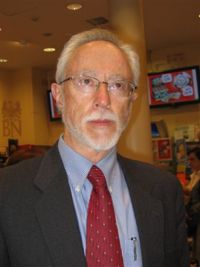|
|||
|
Philatelia.Net / The literature / Plots / The directory «Plots»Coetzee John Maxwell (b. 1940)John Maxwell Coetzee is an author and academic from South Africa (now an Australian citizen living in South Australia). A novelist and literary critic as well as a translator, Coetzee won the 2003 Nobel Prize in Literature. Coetzee was born in Cape Town, South Africa. His father, a lawyer, and his mother, a schoolteacher, were descended from early Dutch settlers dating to the 17th century. Coetzee also has Polish roots, as his great-grandfather Baltazar (or Balcer) Dubiel was a Polish immigrant to South Africa. Coetzee spent most of his early life in Cape Town and in Worcester in Western Cape Province as recounted in his fictionalized memoir, Boyhood (1997). He attended St. Joseph's College, a Catholic school in the Cape Town suburb of Rondebosch, and later studied mathematics and English at the University of Cape Town, receiving his Bachelor of Arts with Honours in English in 1960 and his Bachelor of Arts with Honours in Mathematics in 1961. In the early 1960s, Coetzee relocated to London, where he worked for a time at IBM as a computer programmer; and in 1963 he was awarded a Master of Arts degree from UCT; his experiences there were later recounted in Youth (2002), his second volume of fictionalized memoirs. Coetzee received a Ph.D. in linguistics at the University of Texas at Austin, where his dissertation was on computer stylistic analysis of the works of Samuel Beckett. After leaving Texas he taught English and literature at the State University of New York at Buffalo in New York until 1971. In 1971, Coetzee sought permanent residence in the United States, but it was denied due to his involvement in anti-Vietnam War protests. He then returned to South Africa to become an English literature professor at the University of Cape Town. Upon retiring in 2002, Coetzee relocated to Adelaide, Australia, where he was made an honorary research fellow at the English Department of the University of Adelaide, where his partner, Dorothy Driver, is a fellow academic. He served as professor on the Committee on Social Thought at the University of Chicago until 2003. In addition to his novels, he has published critical works and translations from Dutch and Afrikaans. On March 6, 2006 Coetzee became an Australian citizen. Following the ceremony, Coetzee said that "I was attracted by the free and generous spirit of the people, by the beauty of the land itself and—when I first saw Adelaide—by the grace of the city that I now have the honour of calling my home." He is known as reclusive and eschews publicity to such an extent that he did not collect either of his two Booker Prizes in person. He married in 1963 and divorced in 1980. He had a daughter and a son from the marriage, but his son was killed at the age of 23 in an accident, an event Coetzee confronts in his 1994 novel The Master of Petersburg. Rian Malan wrote that Coetzee is "a man of almost monkish self-discipline and dedication. He does not drink, smoke or eat meat. He cycles vast distances to keep fit and spends at least an hour at his writing-desk each morning, seven days a week. A colleague who has worked with him for more than a decade claims to have seen him laugh just once. An acquaintance has attended several dinner parties where Coetzee has uttered not a single word." As a result of his reclusive nature, signed copies of Coetzee's fiction are very highly sought after. Recognising this, he was a key figure in the establishment of Oak Tree Press's First Chapter Series, a series of limited edition signed works by literary greats to raise money for the child victims and orphans of the African HIV/AIDS crisis. Coetzee has gained many awards throughout his career. The novel Waiting for the Barbarians was awarded the James Tait Black Memorial Prize in 1980, and he is three times winner of the CNA Prize. Age of Iron was awarded the The Sunday Express Book of the Year award, and The Master of Petersburg was awarded the Irish Times International Fiction Prize in 1995. He has also won the French Fémina Prize, the Faber memorial Award, the Commonwealth Literary Award, and in 1987 won the Jerusalem Prize for literature on the freedom of the individual in society. He was the first author to be awarded the Booker Prize twice: first for Life & Times of Michael K in 1983, and again for Disgrace in 1999. Only one author has matched this since - Peter Carey, an Australian. On 2 October 2003 it was announced that he was to be the recipient of the Nobel Prize in Literature, making him the fourth African writer to be so honored, and the second (as he then was) South African (after Nadine Gordimer). When awarded the prize, he was praised for "in innumerable guises portraying the involvement of the outsider." The press release for the award cited his "well-crafted composition, pregnant dialogue, and analytical brilliance," while focusing on the moral nature of his work. The prize ceremony was held in Stockholm on 10 December 2003. Coetzee was awarded the Order of Mapungubwe by the South African government on 27 September 2005 for his "exceptional contribution in the field of literature and for putting South Africa on the world stage." Belgium, 2007, Scene from film «Dust» Advertising: |
|||
© 2003-2025 Dmitry Karasyuk. Idea, preparation, drawing up
|

